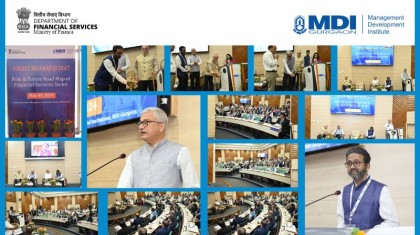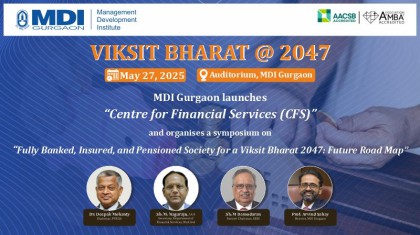School of Management of Financial Institutions
The School of Management of Financial Institutions (SoMFI) was established by MDI Gurgaon. The SoMFI is dedicated to providing education, training, research, and consulting services in the field of banking and finance. It caters specifically to the emerging markets of India and South Asian countries. The primary objective of SoMFI is to produce business leaders who can add value to their organizations while also shaping the sector's landscape through policy-making.
As corporations become more sophisticated and the demand for reliable financial services on a national and global scale increases, there is a pressing need for well-trained professionals in the areas of finance and banking, particularly in emerging fields like digital banking, Fintech, Al and ML in finance, climate and sustainable finance, and risk management. Our academic programs, which include both long- duration post graduate programs and_ short-duration certificate programs, are designed to be research-led and industry-driven, ensuring that our participants receive high-quality education and training in these areas of banking and finance.
The primary objective of SoMFI is to develop future leaders in Banking & Financial Service Sector with an emphasis on Boardroom Leadership Development, Technology Awareness & Corporate Governance.
- Centre for Risk Management in Banks and FIs
- Centre for ESG and Responsible Finance
- Centre for Digital Banking and Payment System
- Centre for Insolvency and Bankruptcy
Essential of the School
Higher education in India is currently undergoing a significant transformation. This shift has been prompted by the National Education Policy 2020 and the COVID-19 pandemic, which have forced higher education institutions (HEIs) in India to reconsider their approaches to growth. The National Education Policy (NEP) 2020 emphasizes the need to bridge the gap between learning outcomes and quality, while also promoting integrity within the system. The thrust of the NEP is to transform higher education into large, multidisciplinary universities and colleges, with clusters of 3000 or more students in every district offering programs across a variety of disciplines.
By 2040, the NEP envisions that all existing Higher Education Institutions (HEIs) will have evolved into multidisciplinary universities falling into one of the following categories: Research Universities (RUs), Teaching Universities (TUs), and Autonomous Degree-granting Colleges (ACs). NEP 2020 aims to transform India into a global destination for accessible, quality, and affordable education, in response to the rising demand with the global youth bulge. This change is in line with the demands of the population in Asia, especially India, which is expected to surpass all other countries in terms of eligible population for another 30 years. Access to quality education and skills for the emerging market will be critical to fulfilling India's vision of a self-reliant India.
While the NEP policy response is a timely and necessary step in addressing the need for quality education in the face of a growing population and establishing global footprints, the pandemic has further emphasized the importance of innovative technology-enabled pedagogy to deliver and improve access to and utilization of quality education. It has also shortened and sharpened the scope of experimentation in this regard.
At the same time, the current timing is opportune for the banking and financial services sector in India. The credit decisions in this field are now powered by data analytics, enabling fast and data-driven decisions by both Fintech companies and FIs. However, the sector is currently witnessing a lack of customer-centricity and digital mindset, especially among PSBs. This is compounded by the fact that a large number of employees in this sector lack exposure to advanced technical, behavioral, and conceptual skills. It has been observed that PSBs in India are unable to create the required number of industry leaders. Approximately 7 lacs plus officers and clerical staffs are in the banking sector alone, and approximately 70% of AGMs above 5 years of tenure are waiting for upskilling. Around 7000 – 8000 mid-level officers (DGMs and AGMs) and around 700-800 senior-level officers (CGMs and GMs) in the banking sector need to be updated with advanced skills for decision-making. In view of the above changes both at country and sectoral levels, the way forward for MDI Gurgaon is to set up multidisciplinary schools, and one among them is the "School of Management of Financial Institutions." The vision and mission of the school are given below.
Vision
- The objective of this institution is to become a prestigious educational establishment in the field of banking and finance, with the aim of cultivating and fostering accomplished finance professionals and leaders.
Mission Statements
- Offering high-quality instructional programs to executives employed in the banking and financial sectors.
- Establishing a consistent and reliable channel for the development of prospective personnel within Public Sector Banks (PSBs) and Financial Institutions (FIs) via prolonged industry-driven initiatives.
- Grooming the next generation of banking leaders in India.
- Creating value for Banks and FIs through responsible research and value adding consulting
Academic Advisory Committee of the School of Management of Financial Institutions
- Prof. Anil Kumar, Professor of Finance & Corporate Governors, Department of Commerce, Delhi School of Economics, University of Delhi
- Dr. Mandeep Singh General Manager (Administration & Finance) with additional charge of CFO of HORCL, Gurugram, HRIDC, Government of Haryana, Chandigarh
- Sh. Raj Kumar, Ex Managing Director of Life Insurance Corporation of India (LIC)
- Dr. Ranjeet Mehta, Executive Director PHDCCI
- Mr. Jyoti Prakash Gadia, Managing Director Resurgent India Limited
Activities of the School
In line with the above drivers of change in higher education paradigm, the School of Management of Financial Institutions (SMFI) aim to undertake following activities.
1. Teaching (Long-duration Programmes)
• Masters’ Level Programme (online / offline)
• Proposed to design long duration masters' programme with digital/tech and behavioural focus.
• Could be PGDM / MS in BFS with focus on tech/digital and behavioural skills
2. Training (MDPs and Certificate Programmes)
• Certificate programmes (online / offline)
• Certificate programmes of durations from 3 - 12 months (11-month programme is already designed)
• Executive training programmes of durations from 2 day – 3 months (BFSI focused MDPs would be delivered by the school)
3. Research and Consulting through Centres of Excellences
• Centre for Risk Management in Banks and FIs
• Centre for ESG and Responsible Finance
• Centre for Digital Banking and Payment system
• Centre for Insolvency and Bankruptcy
4. Knowledge Dissemination (Conferences/ Workshops/ Leadership Talks)
• Academia – Industry Exchange Programme
• Finance Research Fellowship
• Organizing Conferences and Seminars
• Organizing Regular Seminars and Leadership Talks
• Setting up sponsored Chair Professor positions





